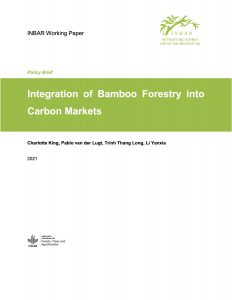Originally published at INBAR’s website.
INBAR’s new policy brief summarises how to include bamboo forestry projects in carbon markets.

According to a recent survey, INBAR Member States are planning to restore 5.7 million hectares of land with bamboo by 2030, as a way to restore degraded soils and protect riverbanks – so why aren’t bamboo forestry projects included more often as offsets in international carbon markets?
Around the world, bamboo is being planted as a solution to restore degraded soils and protect riverbanks.
A new INBAR policy brief explains how to develop and register bamboo forestry projects, so they can be certified by carbon markets. Aimed at project developers and government actors, the brief encourages the inclusion of bamboo forestry projects in carbon offset schemes.
The main points of the report are:
- More countries should be recognising bamboo’s contributions to climate change mitigation. Bamboo plants and durable products can store a lot of carbon: over a 30-year period, a plantation of giant bamboo and its harvested products can store 1.7 times the same amount of carbon as Chinese fir trees. As such, bamboo forests can be traded in carbon markets as ‘offsets’, as long as they are shown to lead to additional carbon being stored, or emissions avoided. Countries, particularly in tropical and subtropical areas where bamboo grows, should make efforts to include bamboo in national and international carbon markets, as well as their national climate strategies.
- Because it is a grass, not a tree, bamboo requires different methods to measure carbon storage. Bamboo culms are hollow, and the relationship between bamboo’s diameter and height with its biomass (and related carbon storage) is different to that of trees. In addition, the denseness of several clumping bamboo species can make it impossible for surveyors to adequately measure the culms’ diameters. To solve this issue, INBAR’s 2019 Manual for Bamboo Forest Biomass and Carbon Assessment provides detailed guidelines for assessing and monitoring biomass and carbon changes in bamboo forests and plantations.
- To be included in carbon markets, bamboo forestry projects must adhere to specific methodologies. There are a few existing methodologies which can certify bamboo forestry projects for a number of different carbon markets, including the Clean Development Mechanism, Verra and the Gold Standard: CDM AR-ACM 003, CDM AR-AMS 007, VCS VM 005, and VCS 007 REDD+MF version 1.6. The INBAR policy brief provides more information on each.
- Further research is needed. Reforestation is not the only way bamboo can contribute to storing or reducing carbon emissions. More research is needed to explore how sustainable management of existing bamboo forests can improve their carbon storage. In addition, methodologies which help assess the carbon stored in durable bamboo products, and the emissions avoided by substituting more carbon-intensive materials with bamboo, would also help increase our understanding of how to scale up bamboo’s applications for climate-smart development.
The policy brief, ‘Integration of Bamboo Forestry into Carbon Markets’, can be read here. It can be cited as: King, C., van der Lugt, P., Thanh Long, T., Li, Y. (2021) Integration of Bamboo Forestry into Carbon Markets. INBAR: Beijing, China.
This article was produced by INBAR.
CGIAR Research Program on Forests, Trees and Agroforestry (FTA) is the world’s largest research for development program to enhance the role of forests, trees and agroforestry in sustainable development and food security and to address climate change. CIFOR leads FTA in partnership with ICRAF, the Alliance of Bioversity International and CIAT, CATIE, CIRAD, INBAR and TBI. FTA’s work is supported by the CGIAR Trust Fund.











